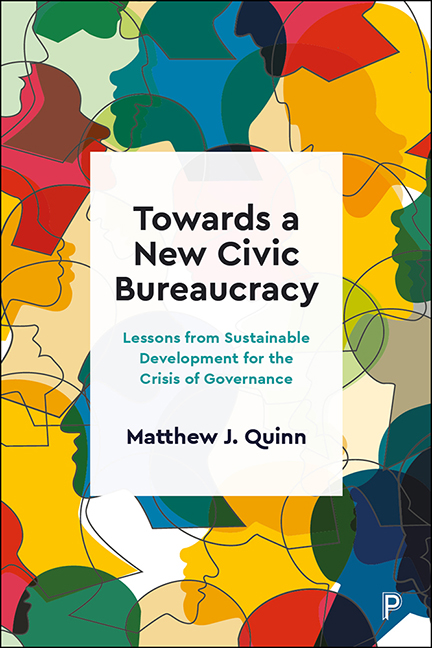Book contents
- Frontmatter
- Dedication
- Contents
- List of figures and tables
- Introduction
- 1 Framing the thinking
- 2 Governance and sustainable development as governmentality
- 3 Bureaucratic practice and governmentality
- 4 Lessons from governing for sustainable development
- 5 A new civic bureaucracy
- Closing words
- Appendices
- References
- Index
4 - Lessons from governing for sustainable development
Published online by Cambridge University Press: 15 September 2022
- Frontmatter
- Dedication
- Contents
- List of figures and tables
- Introduction
- 1 Framing the thinking
- 2 Governance and sustainable development as governmentality
- 3 Bureaucratic practice and governmentality
- 4 Lessons from governing for sustainable development
- 5 A new civic bureaucracy
- Closing words
- Appendices
- References
- Index
Summary
Deliberate destabilization of established ways of doing things – even in the absence of the possibility of imposing a new equilibrium – can be a crucial resource of reformers.
James MeadowcroftWe have seen how existing bureaucratic frames are deeply rooted in the goal of economic efficiency and the desire for control, order and planned uniformity. They are constrained by a structure, toolkit and narratives designed for and on the model of industrial capitalism which seek to remove complexity and ignore or downplay dynamic linkages between society, economy and environment. This has contributed to a milieu in which individual consumption and power are the purpose of life and economic growth the mantra of governance. They have bred a competitive democracy that seems unable to adapt and is now at risk from the siren call of totalitarianism, fed by disconnect from civic life and a nostalgia for old certainties. The mechanistic growth and efficiency model is incompatible with the reflexivity, uncertainty and localized discussion and decisions which are needed to govern for the systemic challenges of sustainable development.
If bureaucracy is to play a part in change, it needs to reflect a primary civic republican aim of building a strong and pluralistic civil society in which everyone, and, in this modern era, also the social and natural world in which we live, are reconnected, rather than enabling systemic dominations. This means bureaucracy itself needs to abandon the industrial analogue of technocratic control and measures of efficiency, siloed division into topics and bounded rationality to be able to mirror instead the ecological analogy of dynamic interconnected socio-ecological systems. This will enable new narratives and considerations to have voice and power within a participative, place-based and reflexive approach. To do this bureaucracy will need to be equipped with express purpose, new narratives, institutions, ways of knowing and measuring and tools. We can identify emergent forms of these alternatives in experiments in governing for sustainable development.
Governing for sustainable development: the Well-being of Future Generations (Wales) Act 2015
Contextualizing the Welsh case
Wales is a largely rural, upland, coastal and post-industrial nation of three million people and is one of the constituent countries of the United Kingdom.
- Type
- Chapter
- Information
- Towards a New Civic BureaucracyLessons from Sustainable Development for the Crisis of Governance, pp. 67 - 92Publisher: Bristol University PressPrint publication year: 2022



